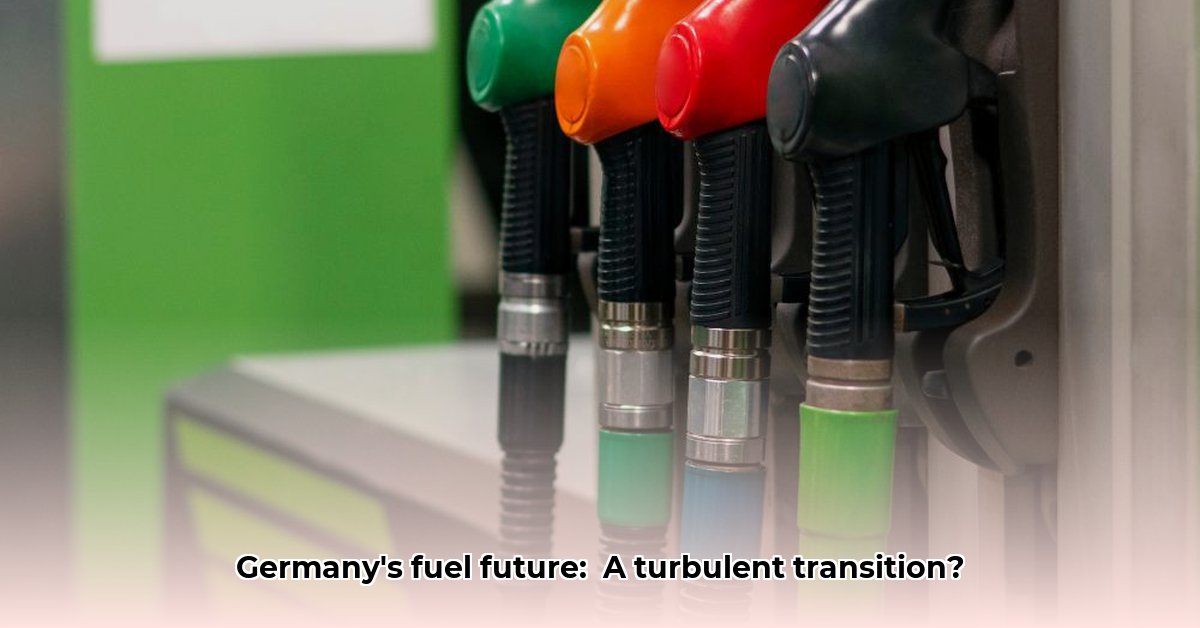Germany’s energy sector is undergoing a significant transformation, and fuel oil companies are at the forefront of this change. This article examines the current state of the German fuel oil market, highlighting key players, technological advancements, regulatory impacts, and future projections. It serves as a guide to understanding the challenges and opportunities facing the industry during this period of energy transition, including low-carbon pathways. For a list of German fuel oil suppliers, see this resource.
Germany’s Energy Market: Transforming the Landscape
The Energiewende, Germany’s ambitious plan to transition to cleaner energy sources, is fundamentally reshaping the energy sector. This shift away from fossil fuels presents both challenges and opportunities for fuel oil companies. As demand for traditional fuel oil decreases, innovative companies are exploring ways to adapt and thrive in this evolving environment, including investments in cleaner alternatives.
Key Insights:
- Adaptation is Key: The Energiewende necessitates that fuel oil companies adopt new strategies to remain competitive as demand shifts.
- Innovation is Crucial: Companies must invest in and embrace new technologies to thrive in a changing energy landscape, developing new fuels and related services.
- Collaboration is Essential: Working with other companies and renewable energy firms is vital for navigating the complexities of the energy transition.
Major Players and Market Dynamics
Several prominent fuel oil companies are active in Germany. Wintershall Dea is recognized as a major player in exploration and production. Other key companies include Shell Deutschland Oil GmbH, BP Europa SE, and TotalEnergies Germany, each adapting to the evolving market through diverse strategies. These companies are not only maintaining their traditional operations but also investing in innovative technologies such as hydrogen production and carbon capture and storage (CCS). Smaller, more agile companies are also emerging, focusing on specialized solutions to support renewable energy integration. Companies like Electrochaea GmbH, which focuses on biological methanation, and Sunfire GmbH, specializing in synthetic fuels, exemplify this trend.
German Regulations: Shaping the Playing Field
German regulations significantly influence fuel oil companies. Stricter pollution limits, government incentives for renewable energy, and policies promoting hydrogen and carbon capture directly impact their operations. The German government’s Energy Security Act, approved in April 2023, exemplifies this proactive approach to diversifying energy sources. These regulations create both obstacles and opportunities, and companies that understand and adapt to them effectively are more likely to succeed. Mastering these rules is essential for navigating the evolving energy landscape.
Future Outlook for Fuel Oil
Predicting the future of fuel oil in Germany is challenging, but a long-term decline in demand is anticipated as the nation pursues its goal of phasing out fossil fuels by 2045. The pace of renewable energy adoption, the success of technologies like Power-to-Liquid (PtL) (producing fuel from renewable energy), and global events will all influence the industry’s trajectory. Government policies and international collaborations will also play a crucial role in shaping the market.
Disruptive Technologies: Reshaping The Energy Sector
Several key technologies hold promise for the future of the fuel oil industry:
- Hydrogen Production: Offers the potential to reduce carbon emissions but requires significant infrastructure investment and cost reductions. Green hydrogen production, utilizing renewable energy sources for electrolysis, could significantly lower the carbon footprint of fuel.
- Carbon Capture and Storage (CCS): Can help mitigate emissions from existing facilities, although public acceptance and safe, long-term storage solutions are crucial. The technology’s efficacy rests on securing robust and reliable storage solutions, alongside overcoming potential public concerns regarding safety and environmental impact.
- Synthetic Fuels: Produced using renewable energy, these fuels could provide a low-carbon alternative, but the technology is still developing and costs are high. The cost-effectiveness of synthetic fuels remains a critical barrier to widespread adoption, requiring further research and development to achieve economic viability.
- Biological Methanation: Offers a sustainable fuel production pathway, converting biogas into synthetic methane, a clean natural gas replacement. However, scaling up production and ensuring a consistent supply of raw materials pose challenges, requiring reliable feedstock supply chains to ensure economic viability.
Assessing the Risks: A Strategic Perspective
| Technology | Short-Term Risks | Long-Term Risks |
|---|---|---|
| Hydrogen Production | High upfront costs, limited infrastructure | Reliance on intermittent renewable energy, storage challenges, competition with other hydrogen applications |
| Carbon Capture & Storage | Expensive implementation, potential public opposition | Risk of leaks, ensuring long-term storage security, high energy consumption of CCS processes |
| Synthetic Fuels | Technology still maturing, high production costs | Difficulty scaling up production, competition from other low-carbon options, high energy input requirements |
| Biological Methanation | Scaling up production, securing raw materials | Uncertain long-term viability, competition from biofuels, efficiency of biogas conversion |
Strategies for Success: Staying Ahead
To succeed in the evolving energy market, German fuel oil companies should adopt a comprehensive strategy:
- Diversification: Invest in low-carbon and renewable energy options, expanding beyond traditional fossil fuels to include biofuels, hydrogen, and synthetic fuels.
- Innovation: Embrace and invest in new technologies, such as carbon capture and storage, hydrogen production, and advanced refining processes.
- Collaboration: Work with other companies and renewable energy firms, forming strategic alliances to access new markets, technologies, and expertise.
- Regulatory Compliance: Adapt quickly and effectively to changing regulations, ensuring adherence to environmental standards and taking advantage of available incentives.
- Sustainability Focus: Integrate sustainability into core business practices, demonstrating a commitment to reducing environmental impact and contributing to Germany’s climate goals.
The future of fuel oil companies in Germany hinges on their ability to adapt, innovate, and plan strategically. Successfully navigating the complexities of the energy transition will be crucial for thriving in this dynamic market.
Navigating German Oil and Gas Regulatory Changes for CCS Investment
Germany’s commitment to climate neutrality by 2045 necessitates significant Carbon Capture and Storage (CCS) deployment, primarily targeting industries that are difficult to decarbonize. Navigating the regulatory landscape requires understanding the evolving Carbon Storage Act (KSpG), crucial for project approvals. Significant investment is needed in CCS infrastructure, including pipeline and storage facilities, while public perception and local acceptance are crucial for successful project implementation.
Understanding Regulatory Shifts
The revised KSpG is central to understanding the regulatory landscape, as this act governs CO2 pipeline construction and storage approval. Navigating its complexities is key, with companies needing to understand the permitting process, environmental impact assessments, and public consultation requirements. The KSpG requires detailed site characterization, long-term monitoring plans, and financial guarantees to ensure the safety and integrity of CO2 storage.
CCS Investment Opportunities
CCS investment potential in Germany is significant, particularly for heavy industries like cement and steel, which are hard to decarbonize through other means. The approval process requires a detailed approach:
- Feasibility Study: Conduct a thorough evaluation of geological suitability, infrastructure needs, and regulatory compliance. Key considerations include the availability of suitable geological formations, the proximity to CO2 emission sources, and the potential for CO2 utilization.
- Permitting: Engage early with authorities to secure all necessary permits through clear communication and transparency. This includes engaging with the Federal Ministry for Economic Affairs and Climate Action (BMWK) and local regulatory agencies to ensure compliance with all relevant regulations and guidelines.
- Infrastructure Development: Secure funding to invest in CO2 pipelines and storage sites. Collaboration with infrastructure providers and government agencies is crucial to develop a robust and cost-effective CCS infrastructure.
- Environmental Impact Assessment: Conduct a comprehensive assessment, implementing mitigation measures. This includes assessing the potential impacts on groundwater resources, air quality, and local ecosystems, and implementing measures to minimize these impacts.
- Public Engagement: Proactively engage with local communities to build acceptance. This includes conducting public forums, providing transparent information about the project, and addressing any concerns or questions from the community.
Risk Assessment Matrix
| Risk Factor | Likelihood | Impact | Mitigation Strategy |
|---|---|---|---|
| Regulatory Uncertainty | Medium | High | Engage with regulatory bodies, stay informed of legislative changes, participate in regulatory consultations. |
| Public Opposition | Medium | Medium | Proactive community engagement and transparent communication, address community concerns and provide tangible benefits. |
| Technological Challenges | Low | High | Invest in R&D, partner with experienced providers, and conduct thorough testing, implement robust monitoring and control systems. |
| Financial Risk | Medium | Medium | Secure diverse funding sources and incorporate risk analysis into financial models, explore government subsidies and incentives. |
| Environmental Risks (Leakage) | Low | High | Employ robust monitoring and geological stability for site selection, implement comprehensive monitoring and leakage detection systems. |
Germany’s commitment to climate neutrality presents a crucial opportunity for those who can adapt to the changing regulatory landscape.
German Fuel Oil Companies: International Market Diversification Strategies
Germany’s Energiewende is compelling fuel oil companies to adapt, while its reliance on imported oil necessitates diversification. International strategies are crucial for survival, opening opportunities in low-carbon fuels and related services, emphasizing collaboration and innovation.
The Importance of Diversification
Germany imports approximately 90% of its oil, making the nation vulnerable to price fluctuations and geopolitical instability. International diversification mitigates this risk, securing a more stable supply chain and offering access to new customer bases and improved profit margins
- Unlock Your Future: Community Colleges in Florida with Childhood Education Programs – Your Affordable Path - September 14, 2025
- Unlock Futures: Catawba College Growth Strategy Insights 2025 - September 14, 2025
- Your Complete Guide to Eastfield Community College | 2025 Programs & Insights - September 14, 2025



![Fast Track Your Legal Career: Broome Community College Paralegal Studies AAS [2025 Guide] broome_community_college_paralegal_studies_edited](https://baufinanzierung-ausland.de/wp-content/uploads/2025/08/broome_community_college_paralegal_studies_edited-150x150.jpg)











